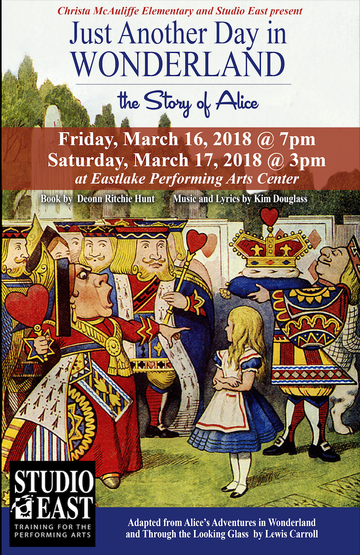This years' play is based on Alice in Wonderland but with a twist! It is open to all 4th and 5th grade students who would like to participate in a fun musical production. Studio East provides the directors, script, music, set and costumes while McAuliffe provides kids who want to have an awesome theatre experience! Rehearsals are under way and our student thespians are excited!
Performances take place at Eastlake High School Performing Arts Center on
Information about the play and how to purchase tickets will be coming home in Payload Packets some time in March.
Have questions or concerns? Email our School Play Chair, Anne McKenzie.
Performances take place at Eastlake High School Performing Arts Center on
- March 16th, 7pm
- March 17th, 3pm
Information about the play and how to purchase tickets will be coming home in Payload Packets some time in March.
Have questions or concerns? Email our School Play Chair, Anne McKenzie.
Studio East Training for the Performing Arts is a 501(c)3 nonprofit providing theater arts education and opportunities for children in Kirkland and surrounding communities. Starting with one theater program for teens in 1992, Studio East has become one of the largest children’s theater training programs in the Seattle Metro area. Today, between the Studio’s camps and classes and its professional, adult touring arm, StoryBook Theater, Studio East serves over 70,000 people annually.
Read more on the Mission and Philosophy of Studio East here or click the logo above to visit their website.
Read more on the Mission and Philosophy of Studio East here or click the logo above to visit their website.
Benefits of Participating in Drama Programs
There is a lot of established research about the positive influences of drama, theatre and the performing arts, especially on young people. The benefits are physical, emotional, social, and they help to develop a healthy appreciation of culture and the arts. Here are 11 important benefits that can help your child blossom:
|
Imagination
Immersing yourself in the imaginary world of theatre, being creative in a role, and learning to make creative choices helps students think of new ideas, allowing them to view the world around them in new ways. Einstein said,“Imagination is more important than knowledge.” Empathy Understanding characters, roles and the subtext of plays and musicals allows students to relate better to different situations, backgrounds, and cultures. It encourages them to show compassion and tolerance for others. Cooperation Theatre is a collaboration of different players. In many cases the quality of any performance relies on an ensemble performance. Combining the creative ideas and the abilities of all participants is required for the best outcomes. This requires all those taking part to engage in discussions, feedback, rehearsing, and performing together. Concentration Playing, practicing, and performing will develop the ability and skills to be able to focus the mind, the body, and the voice. Self-Confidence Aspects of performing arts, especially improvisation, helps young people to understand how to appraise situations, think outside the box and be more confident going into unfamiliar situations. Students learn to trust their ideas and abilities. Confidence gained from learning performing arts skills applies to school, career, and life. |
Communication Skills
It seems obvious to say that drama, theatre and the performing arts improves verbal and nonverbal communication, but it is worth stating that this benefits young people through their life. It improves vocal projection, articulation, tone of speech and expression. It also develops listening and observation skills. Fun Drama brings elements of play, humour, and laughter to those taking part and viewing the performance. Drama improves motivation and reduces stress. Emotional Outlet Acting and drama games allow students to express a range of emotions and encourage them to understand and deal with similar feelings they may be experiencing. Aggression and tension are released in a safe, controlled environment – often allowing for a period of reflection afterwards. Physical Fitness Performing, even the most passive performances, requires physical exertion from cardiovascular to calming nerves. Many performing arts exercises improve flexibility, coordination, balance, and control. Memory Rehearsing and performing lines and movements will improve memory. Your memory requires exercise, just like a muscle. |
Appreciation for Arts and Culture!
...a benefit that transcends cultures and time.
...a benefit that transcends cultures and time.

